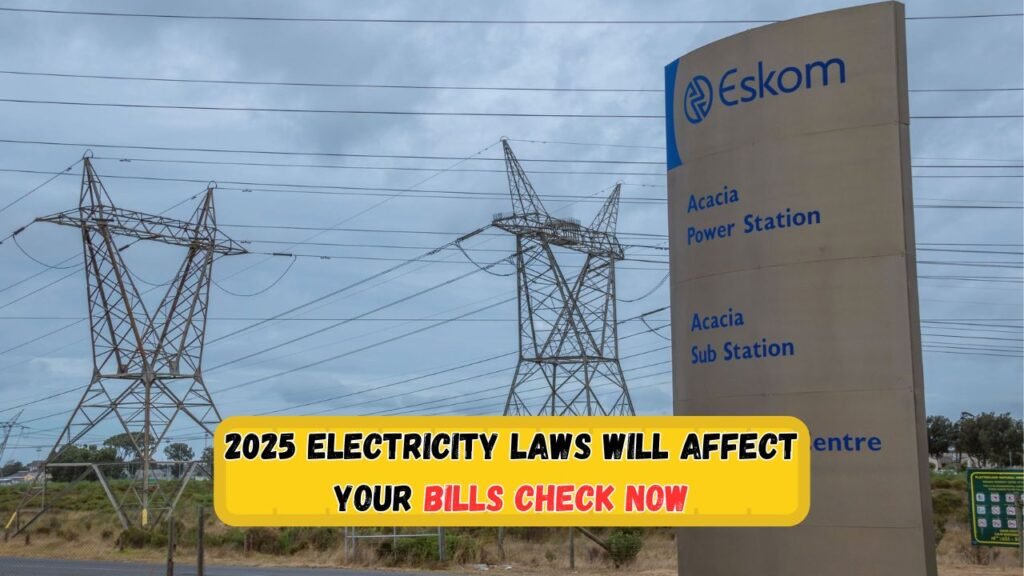2025 electricity laws: The upcoming 2025 electricity laws are set to revolutionize daily life for South African households. As the country moves towards sustainable energy solutions, these new regulations aim to address the challenges of energy efficiency and consumption. With South Africa’s commitment to reducing carbon emissions and integrating renewable energy sources, these laws will play a pivotal role in shaping the future of energy usage. Homeowners can expect a series of changes that will not only affect their electricity bills but also encourage the adoption of green technologies. As the nation gears up for these transformative policies, the implications for everyday life are profound, offering both challenges and opportunities.

Impact of 2025 electricity laws on household energy consumption
The implementation of the 2025 electricity laws is poised to significantly influence household energy consumption across South Africa. One of the primary goals of these regulations is to promote energy efficiency, which will encourage households to adopt more sustainable practices. The laws are expected to mandate energy-saving appliances, which will help reduce overall electricity usage. This shift is not only beneficial for the environment but also for consumers, as it can lead to substantial savings on electricity bills. Furthermore, the introduction of smart meters will allow homeowners to monitor their energy consumption in real-time, providing greater control over their usage patterns. By incentivizing the use of renewable energy sources like solar panels, these laws will also facilitate a reduction in dependency on the national grid. As households begin to embrace these changes, the cumulative effect will contribute to a more sustainable energy landscape in South Africa.
Benefits of renewable energy incentives for South African homes
The 2025 electricity laws introduce a range of incentives designed to encourage the adoption of renewable energy solutions among South African households. These incentives aim to make renewable energy technologies more accessible and affordable, thereby promoting their widespread use. By offering tax breaks and subsidies for solar panel installations and other renewable energy systems, the government hopes to accelerate the transition to a greener energy model. For homeowners, this presents an opportunity to reduce their carbon footprint while also enjoying cost savings over time. The increased use of renewable energy will not only lessen the strain on the national power grid but also provide a more stable and reliable energy supply. Additionally, as more households generate their own electricity, there is potential for selling surplus power back to the grid, creating an additional revenue stream. These incentives are a critical component of the 2025 electricity laws, driving the shift towards a more sustainable and resilient energy future.
Challenges in implementing the 2025 electricity laws for households
While the 2025 electricity laws present numerous benefits, their implementation may also pose challenges for South African households. One of the primary concerns is the initial cost of transitioning to energy-efficient appliances and renewable energy sources. Although incentives are in place, the upfront investment can be significant, potentially deterring some homeowners from making the switch. Moreover, there may be a learning curve associated with the adoption of new technologies, such as smart meters and home energy management systems. This could require households to invest time and effort into understanding and optimizing their energy usage. Additionally, there may be logistical challenges related to the installation and maintenance of renewable energy systems, particularly in remote or underserved areas. Despite these hurdles, the long-term benefits of the 2025 electricity laws are expected to outweigh the initial obstacles, paving the way for a more sustainable energy future.
Future outlook: South Africa’s energy landscape post-2025
Looking beyond the immediate impact of the 2025 electricity laws, the future energy landscape of South Africa appears promising. As these regulations take effect, they are expected to catalyze a broader transition towards a sustainable energy ecosystem. The increased adoption of renewable energy sources will likely lead to a significant reduction in the country’s carbon emissions, aligning with global climate goals. Additionally, the emphasis on energy efficiency and smart technologies will foster innovation and drive economic growth within the energy sector. As more households become energy independent, the demand on the national grid will decrease, potentially leading to lower energy costs for all South Africans. The 2025 electricity laws represent a crucial step towards a cleaner, more sustainable future, with the potential to transform the nation’s energy landscape for generations to come.




